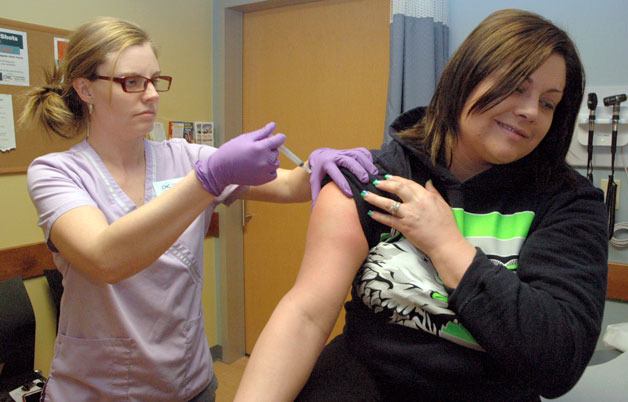Flu season has hit Snohomish County, and everyone needs to be protecting themselves.
The 2013-14 flu season has resulted in not only 30 hospitalizations due to the flu within the county, but also the county’s first confirmed death of the season on Jan. 4, when a Bothell woman in her 30s, with underlying health conditions, died from influenza complications in a King County hospital.
Kristin Kinnamon, communications manager for the Snohomish Health District, noted that this season’s flu hospitalizations are fewer than last season’s at this time, but added that this flu season started slightly later in the year than the previous one.
“The median age of these reported hospitalizations is 40, so the average age of people being impacted is younger than it was last season, and people younger than 65 tend to get vaccinated less often,” Kinnamon said. “The dominant strain this season has been H1N1, the ‘swine flu,’ which is more serious for younger people than other strains. In 2009, the first year that H1N1 hit the scene, the county had seven flu deaths, and most of them were younger. That’s the reason why, after 2009, the Centers for Disease Control went from recommending the flu vaccine for seniors to recommending it for everyone who’s 6 months and older.”
Nancy Furness, director of the Communicable Disease Division at the Snohomish Health District, pointed out that seven county residents also died from influenza-related illness in 2013.
Just as the Snohomish Health District’s clinic in Everett has vaccine to protect adults and children alike against the flu, so too are the Community Health Center of Snohomish County administering flu shots to their patients.
While the Snohomish Health District’s Everett Immunization Clinic is located in Suite 108 at 3020 Rucker Ave., and is charging $30 per adult and $23 per child, patients of the Community Health Center are able to get their flu shots for $20 each.
Those receiving their shots at the SHD’s clinic must call 425-339-5220 for an appointment between 8 a.m. and 4 p.m. on Mondays, Wednesdays or Fridays, but CHC patients need not schedule appointments for their shots, so long as they visit any of the CHC’s five locations during regular business hours, including two in Everett and one in Arlington.
Since Oct. 1, 2013, the Community Health Center of Snohomish County has given 3,857 total flu shots, among them 2,497 at their two Everett locations, with 73 flu shots given at Arlington to date.
“This flu season hasn’t peaked yet,” said Dr. Steve Aguila, of the Community Health Center of Snohomish County in Arlington, echoing Kinnamon’s warning that the season is still ramping up. “The problem is that the 26-64 age group has always been the least likely to get immunized, and while most of them get over the flu, a very small percentage overreact to it, and there’s no way to know if you’re one of those people.”
By contrast, Aguila advised prospective patients to worry less about the influenza vaccine itself.
“The current vaccine is very safe,” Aguila said. “I don’t know of anyone, and I don’t work with anyone who knows of anyone, who’s had any permanent problems from it. Sometimes you might feel a bit achy and fatigued, but imagine that times 10, and that’s what you’d be feeling if you actually had the flu.”
Aguila and Kinnamon jointly dispelled the notion that one can contract the flu from the vaccine itself, and agreed that any instances in which patients came down with severe flu symptoms after being vaccinated are the result of those patients already being infected with the flu before they’d received their immunizations.
Aguila and Cascade Valley Hospital Emergency Room physician Dr. Andrew Peet likewise both warned that the only ways they can treat the flu, after a patient has already contracted it, is within 48 hours or not at all.
“If you have a low-grade fever and a runny nose, you have a cold,” Aguila said. “If you have a fever of 102 degrees and it suddenly feels like you’ve been hit by a mack truck, you have the flu, and you need to see us right away. We conduct rapid flu identification right in our offices, and we can provide you with anti-flu agents on the spot. If you wait three or four days to come in, though, nothing we can do will really make a difference. From there, your best bet is just a routine of Tylenol, ibuprofen and plenty of fluids.”
Peet underscored the health complications than can befall not only those younger than 5 and older than 65, but also those with respiratory or chronic conditions, such as diabetes, as well as pregnant women and Native Americans.
“The majority of people, however, should be fine,” said Peet, who estimated that 15-20 percent of the Cascade Valley ER’s patients have come in for flu-like symptoms since the start of the season. “This means that, if you do contract the flu, and you don’t catch it within that 48-hour window for us to treat it with antiviral medication, you should stay home. Don’t go to your office, don’t risk spreading it around. The public gets understandably concerned when they hear that a flu strain has caused deaths, but where they should be focusing their concern is on prevention, rather than trying to treat it after the fact.”
You can visit www.flu.gov for more information about the flu, and www.doh.wa.gov for statewide health updates. For the Community Health Center of Snohomish County’s locations and hours of operation, log onto www.CHCsno.org.







